Neck & Back Pain
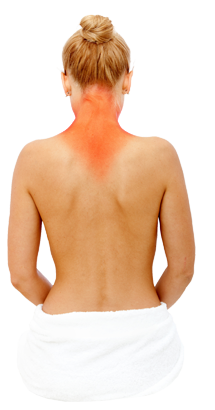
Chiropractors commonly treat people with neck pain. These issues can arise from a variety of tissues including joints, intervertebral discs, muscles, tendons and ligaments. These tissues can refer pain into the head (headaches), shoulder, arm and hand. Nerve injury in the neck can create pins and needles, numbness and sharp shooting pain in the arm. Because the jaw and cervical spine are closely linked, issues in these areas commonly coexist. Examples of commonly treated conditions are:
Cervicogenic headache
Cervical facet synovitis (Facet joint sprain)
Cervical internal disc disruption (Disc protrusion, bulge or herniation)
Forward head carriage
Thoracic outlet syndrome
Upper trapezius tightness
Levator scapula syndrome
Whiplash Associated Disorders
TMJ (jaw) disorder
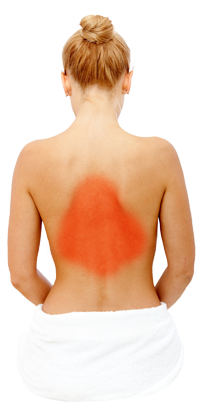
Many patients seek our care for mid-back pain and stiffness. The thoracic spine is commonly immobile as a consequence of our daily lives and poor postural habits. This can result in tight painful muscles as the muscles in this area are overworked in an attempt to create movement.
The result is mid back pain, immobility, stiffness or a restriction of movement in the mid back and rib cage. Chiropractic treatment techniques aim to reduce muscular tension, promote movement and hence alleviate mid back pain. This area commonly requires lifestyle changes and an exercise program including stretching and strengthening muscles.
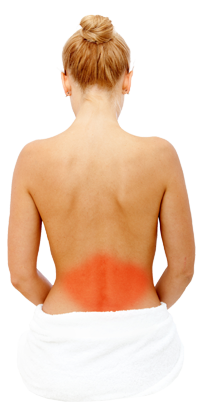
It is estimated that 70–90% of people will suffer from lower back pain in some form at some point in their lives. Common causes of lower back pain include poor core strength, decreased lumbar and pelvic mobility due to lifestyle factors e.g increased sitting time, muscle imbalances and trauma e.g sporting injuries and slips/falls.
Irvine Chiropractic takes a wholistic approach to treating both the cause and the symptoms of lower back pain. Once a definitive diagnosis is made we can apply the correct therapy to ensure a speedy recovery and prevent reoccurrence.
Examples of commonly treated conditions are:
Lumbar facet synovitis (Facet joint sprain)
Lumbar internal disc disruption (Disc protrusion, bulge or herniation)
Lumbar instability (possible retrolithesis or anterolithesis)
Quadratus lumborum syndrome
Lumbar erector spinae tightness
Lumbar related sciatica
Central stenosis
Non-specific mechanical low back pain
Hip extension weakness
Sacroiliac capsulitis (Sacroiliac joint sprain)
Upper Limb Pain

Shoulder pain is a common presentation in our clinic. Treating shoulder pain requires an in depth understanding of shoulder anatomy, biomechanics, compensatory movement patterns and rehabilitative exercises. Alterations to ideal movement patterns can lead to degenerative changes in the shoulder resulting in tendinopathies, bursitis, muscle tears and pain. At Irvine Chiropractic, after we reach a diagnosis we will assess the movement of all of the joints in the shoulder and begin treatment. A shoulder will always require some form of muscular retraining and we will guide you along the way.
Examples of commonly treated conditions are:
Supraspinatus rotator cuff injury
Internal rotator cuff injury- subscapularis tear
External rotator cuff injury- infraspinatus and/or teres minor tear
Shoulder instability
Frozen shoulder (Adhesive capsulitis)
Scapula winging
Rounded shoulder posture
SLAP lesion
Shoulder impingement
Bicipital tendon injury
Pectoralis major strain
Post surgery routine

Elbow pain is most often related to an overload of the tissues at the elbow and most commonly includes the large tendons that attach the flexor and extensor muscles of the wrist. This is usually as a result of poor biomechanics at the shoulder and or wrist. At Irvine Chiropractic we assess and treat all joints to ensure proper movement and function above and below the elbow.
We utilize soft tissue release techniques along with joint manipulation and exercises to reduce tendon irritation and improve pain levels.
Examples of commonly treated conditions are:
Golfers elbow (medial epicondylosis)
Tennis elbow (lateral epicondylosis)
Throwers elbow
Olecranon bursitis
Bicep muscle tear

The wrist is a complicated area and is often injured due to overload from the elbow and shoulder. Nerves that arise from our neck supply the muscles and skin around the wrist so we will always assess this area as part of a thorough examination. Joint restrictions anywhere within the thoracic/cervical spine, or the arm can lead to muscular and/or nerve tension.
Examples of commonly treated conditions are:
Carpal tunnel syndrome
De Quervain's syndrome
Intersection syndrome
Referred or radicular pain from the cervical spine and nerves.
Lower Limb Pain
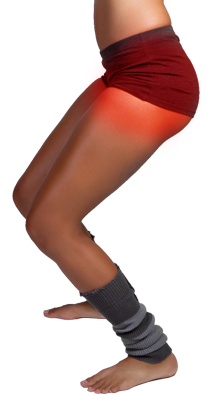
Like the shoulder joint the hip is a complex joint. Pain and dysfunction arising in the hip can cause issues throughout the lower back, knee and ankle. As there are many muscles that cross the hip joint, assessment of this area will include thorough muscle testing to determine which muscles may not be functioning well. We will pay particular attention to the muscles that stabilise the hip and pelvis as any instability may lead to unbalanced loading and possible injury. Treatment of this area will include soft tissue and joint mobilisations as well as some stretching and strengthening techniques to ensure ongoing stability and reduce re-injury.
Examples of commonly treated conditions are:
Trochanteric or hip bursitis
Hip osteoarthritis
Acetabular labrum tear
Hamstring strain or injury
Sciatica
Gluteus medius syndrome
Hip extension weakness
Piriformis syndrome
Iliopsoas syndrome (Hip flexor)
Iliopsoas tendonitis
Snapping hip syndrome

Pain in the knee is often a result of injuries or dysfunction in the hip or ankle. This makes the knee the area most likely to be injured when there is any imbalance throughout the lower limb. The knee has many structures within it which may be injured and it relies heavily on the surrounding muscles for its strength. Tissues that can be injured in the knee joint include the meniscus, ligaments, tendons and bursa and pain can present suddenly or slowly.
Examples of commonly treated conditions are:
Anterior knee pain
ITB syndrome
Patella tendinopathy
Patellofemoral pain syndrome
Infrapatellar fat pad syndrome
Popliteus muscle strain
Knee meniscus tear of the posterior horn
Knee ligament injury
Calf muscle strain
Osteochondritis Dissecans
Knee osteoarthritis (Degenerative arthritis)
Chondromalacia
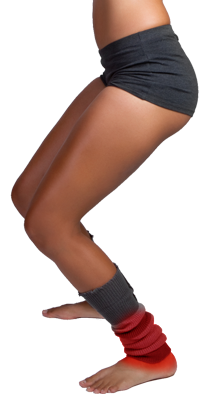
The ankle and foot consist of 26 bones and 33 joints. This complex anatomy requires many strong muscles, ligaments and tendons to move and stabilise. Acute injuries to the ankle can result in ligamentous injury, whilst chronic overuse injuries include various tendinopathies such as achilles and tibialis posterior. Irvine Chiropractic will assess your ankle stability and any muscular imbalances that result in these overuse injuries, while acute injuries are treated with active treatment modalities aimed at reducing inflammation, pain and improving pain free motion.
Examples of commonly treated conditions are:
Lateral ankle sprain
Medial ankle sprain
Achilles tendinitis
Plantar fasciitis
Medial tibial stress syndrome
Osteochondral lesion of the talus
Tibialis posterior syndrome
Anterior tibial compartment syndrome
Calf muscle strain
Over-pronation or flat feet
Pre & Post Surgical Rehabilitation
The purpose of pre & post-surgical rehabilitation is to provide a rapid recovery utilizing the best possible techniques both before and after surgery. Your practitioner will maintain close communication with the physician in order to fully understand what procedure you are undergoing and to prepare your individual treatment plan.
At Irvine Chiropractic our practitioners are fully trained in the techniques necessary to prepare the body for an array of surgeries including those for the knee, ankle and shoulder.
If you are going to take the time to get a surgical procedure done it only makes sense to choose wisely regarding your rehabilitation. At Irvine Chiropractic we utilize the most up to date techniques to ensure your recovery stays on track.

